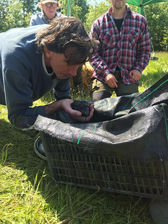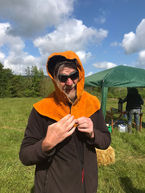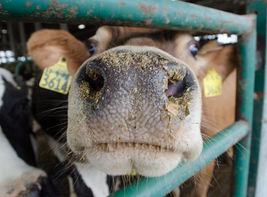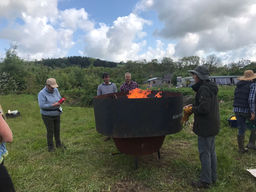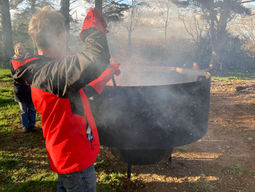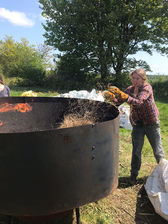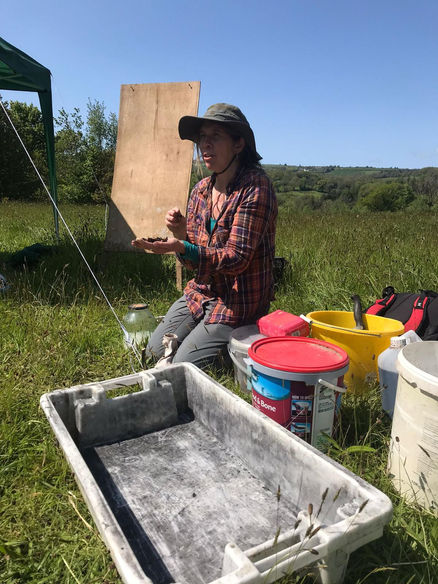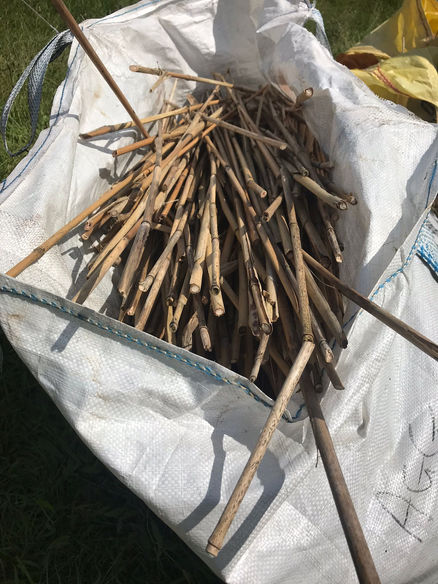

Heath and Hedgerow
Heath & Hedgerow Sir Benfro is a project run by Cwm Arian Renewable Energy (CARE) from May 2022 - June 2023.
It aimed to support land owners and managers to realise ecological and monetary value and mitigate climate change by managing organic material (biomass) and waste products.
The Project
Heath and hedgerows are iconic features of the Pembrokeshire landscape. We believe they offer valuable resources and services, including ecological and economic benefits, and carbon sequestration.
CARE launched Heath & Hedgerow Sir Benfro, a project running from May 2022 - June 2023. It aimed to support land owners and managers to realise ecological and monetary value, and mitigate climate change through managing organic material (natural biodegradable matter or 'biomass') and "waste" products.
This biomass, such as hedgerow cuttings, brash, bracken, heather and gorse, which are often seen as undesirable or unproductive in agriculture, can become useful resources. We believe they can help farmers and land managers reduce input costs, increase fertility, reduce environmental harm and benefit ecosystem services.
Heath & Hedgerow Sir Benfro will:
-
Pilot Innovative Uses For Waste Biomass
-
Provide support and training
-
Create network opertunities
Focusing on three main work streams:
Read below for more details!
Biochar
Essentially, biochar is a charcoal like substance that's made by burning organic material (also know as biomass) in a low-oxygen environment, controlled process known as pyrolysis.
Successful applications of biochar in livestock farming, arable and horticulture settings are gaining interest.
Biochar can provide the following agricultural benefits:
-
Improvement of soil fertility and crop yields.
-
Better water retention and drainage.
-
Reduction of soil acidity.
-
Adsorption of soil pollutants.
-
Reduction in nutrient run-off.
-
Increase in plant disease resistance.
-
Capturing and storing carbon.
-
Reducing ammonia, and therefore greenhouse gas emissions, from animals fed biochar.
-
Improved viscosity and reduced odour of slurry.
Biochar has many applications, including as animal feed, slurry amendment, carbon store and water filter. We will be investigating some of these uses - get in touch if you're interested.
Composting
One of the inspirations for this project is the ongoing cycle of nutrients from decomposition of biomass to fertile soil in the natural world. Compost is a key component of most growing techniques and is considered by most to be essential to a successful crop.
Our composting activity aims to create the most nutritionally dense compost which can enrich soils with long-lasting benefits. We have already started creating our first exploratory batches of biochar hot composts which we are hoping to refine. We'll be offering training, knowledge exchange and support to others to produce high-quality compost.
Animal Bedding
Waste organic matter can be used as an alternative bedding material for animals. Woodchip and heath-land plants (heather, gorse, bracken) make good animal bedding. When sourced responsibly, these products can also increase biodiversity through managing important wildlife habitats.
Adding biochar to animal bedding can reduce odours through its properties as a biofilter. There is also a great secondary benefit as the bedding can then be composted and the biochar becomes pre-inoculated and activated by the beneficial microbes, creating a more complex and richer compost.
Blog posts from Heath & Hedgerow
Cyllidwyd y prosiect hwn drwy Cymunedau Gwledig Llywodraeth Cymru - Rhaglen
Datblygu Gwledig Cymru 2014-2020, a ariennir gan Lywodraeth Cymru a’r Gronfa
Amaethyddol Ewrop ar gyfer Datblygu Gwledig.
This project has received funding through the Welsh Government Rural Communities -
Rural Development Programme 2014-2020, which is funded by the European Agricultural
Fund for Rural Development and the Welsh Government.
















